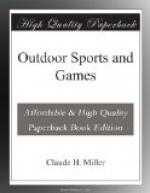Marksman: A scout must pass the following tests for miniature rifle shooting from any position: N.R.A. Standard Target to be used. Twenty rounds to be fired at 15 or 25 yards. Highest possible, 100 points. A scout gaining 60 points or over to be classified as marksman. Scoring: Bull’s-eye, 5 points; inner, 4 points; magpie, 3 points; outer 2 points. Also: Judge distance on unknown ground: Five distances under 300 yards, 5 between 300 and 600 yards, with not more than an error of 25 per cent. on the average.
Master-at-arms: A scout must attain proficiency in two out of the following subjects: Single-stick, quarter-staff, fencing, boxing, jiu-jitsu and wrestling.
Missioner: The qualifications are: A general elementary knowledge of sick-nursing; invalid cookery, sick-room attendance, bed-making, and ventilation. Ability to help aged and infirm.
Musician: A scout must be able to play a musical instrument correctly other than triangle, and to read simple music. Or to play properly any kind of musical toy, such as a penny whistle, mouth-organ, etc., and sing a song.
Pathfinder: It is necessary to know every lane, by-path, and short cut for a distance of at least two miles in every direction around the local scouts’ headquarters in the country, or for one mile if in a town, and to have a general knowledge of the district within a five-mile radius of his local headquarters, so as to be able to guide people at any time, by day or night. To know the general direction of the principal neighbouring towns for a distance of twenty-five miles, and to be able to give strangers clear directions how to get to them. To know, in the country, in the two-mile radius, generally, how many hayricks, strawricks, wagons, horses, cattle, sheep and pigs there are on the different neighbouring farms; or, in a town, to know in a half-mile radius what livery stabling, corn chandlers, forage merchants, bakers, butchers, there are. In town or country to know where are the police stations, hospitals, doctors, telegraph, telephone offices, fire engines, turncocks, blacksmiths and job-masters or factories, where over a dozen horses are kept. To know something of the history of the place, or of any old buildings, such as the church, or other edifice. As much as possible of the above information is to be entered on a large scale map.
Photographer: A scout must have a knowledge of the theory and use of lenses, and the construction of cameras, action of developers. He must take, develop and print twelve separate subjects, three interiors, three portraits, three landscapes and three instantaneous photographs.
Pioneer: A scout must have extra efficiency in pioneering in the following tests, or suitable equivalents: Fell a nine-inch tree or scaffolding pole neatly and quickly. Tie eight kinds of knots quickly in the dark or blindfolded. Lash spars properly together for scaffolding. Build model bridge or derrick. Make a camp kitchen. Build a hut of one kind or another suitable for three occupants.




